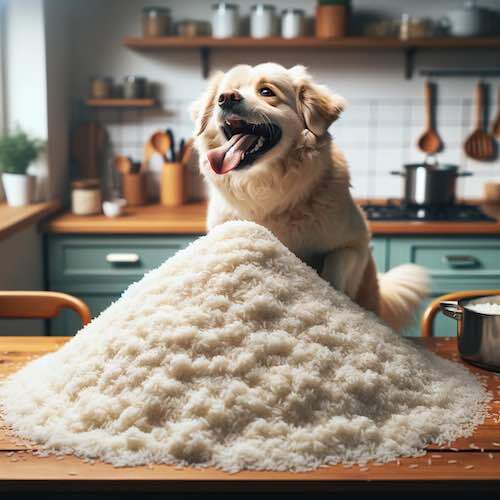Can Dogs Eat Rice? Benefits & How to Serve It
As devoted dog owners, we’re constantly attentive to the dietary choices of our beloved pets, striving to fulfill their nutritional requirements while protecting them from any dietary risks. One common query that surfaces among pet enthusiasts is whether it’s safe for dogs to consume rice. Indeed, rice is a perfectly acceptable food for dogs. This ubiquitous grain, a staple in kitchens around the globe, offers numerous health benefits when integrated properly into a canine’s diet. This detailed guide aims to explore the nutritional advantages of including rice in your dog’s meals, the most effective methods to prepare and serve it, and tackle prevalent doubts and queries surrounding its consumption.
Read More: Top 10 Best Rated Dog Food Brands
Rice, when administered in moderation, can be a source of energy, fiber, and essential nutrients for dogs, contributing to a well-rounded diet. It’s particularly noted for its ease of digestion, making it an ideal choice for pets with sensitive stomachs or during times of gastrointestinal distress. Whether you’re considering rice as a regular dietary inclusion or as a temporary dietary solution, understanding its role and benefits in canine nutrition is crucial.
We’ll also provide practical tips on the types of rice most suitable for dogs, portion sizes, and the importance of balance with other dietary components. Join us as we delve deeper into the significance of rice in your dog’s diet, ensuring you’re well-equipped to make informed decisions for the health and happiness of your furry friend.
Understanding the Nutritional Profile of Rice
Understanding the nutritional profile of rice is key to recognizing its value in a dog’s diet. As a carbohydrate-dense food, rice serves as an excellent energy source, crucial for active and energetic dogs. Although relatively low in fat and providing some protein, the nutritional benefits of rice extend beyond these macronutrients. The distinction between brown and white rice plays a significant role in its nutritional value.
Brown rice, with its intact bran and germ layers, offers a superior nutrient profile, including higher levels of fiber, which aids in digestion and promotes a healthy gut. Additionally, it’s a source of essential vitamins and minerals like magnesium, phosphorus, and selenium, which are vital for maintaining your dog’s overall health. These nutrients contribute to bone health, metabolic functions, and antioxidant defenses, making brown rice a preferable choice for those looking to enrich their dog’s diet with a wholesome, energy-providing grain.
Benefits of Rice in a Dog’s Diet
- Digestive Health: Rice’s high digestibility makes it especially beneficial for dogs with sensitive stomachs or those experiencing gastrointestinal upset, often recommended as part of a bland diet for recovering pets. This gentle food helps soothe the digestive tract, allowing for a more comfortable recovery from symptoms like diarrhea or vomiting. Additionally, rice can act as a binding agent, helping to firm up stools and reduce the frequency of bowel movements. Its bland nature reduces the risk of irritating the stomach, making it a safe choice during periods of digestive sensitivity. By incorporating rice into their diet during these times, dogs can receive necessary nutrients without exacerbating their condition, facilitating a quicker return to normal digestive function.
- Energy Source: The carbohydrates in rice not only provide a quick source of energy but also help sustain it over time, making it an excellent addition to the diet of active dogs or those needing extra calories. This is particularly important for dogs involved in regular physical activity or those with high metabolic rates who may require additional energy sources to meet their demands. Rice’s complex carbohydrates are broken down into glucose, which serves as a vital energy source for cells, muscles, and brain function. By integrating rice into their meals, active dogs can maintain their energy levels throughout the day, supporting their overall health and vitality. This makes rice a practical and beneficial dietary component for ensuring that dogs have the energy they need to stay active and healthy.
- Gluten-Free Benefits: Rice’s gluten-free nature makes it an indispensable dietary option for dogs with allergies or intolerances to gluten, a common irritant found in many grains. This characteristic ensures that sensitive dogs can enjoy the benefits of a grain-inclusive diet without the risk of triggering an allergic reaction, which can range from skin issues to more severe gastrointestinal distress. Incorporating rice into the diet of gluten-intolerant dogs provides them with a safe source of carbohydrates, vital for their energy needs, without compromising their health. It opens up a world of dietary diversity for them, allowing for balanced nutrition that supports overall well-being while catering to their specific dietary restrictions.
- Nutritional Supplement: Brown rice, as a nutritional supplement, goes beyond merely providing dietary fiber for healthy digestion. It’s packed with essential vitamins like B vitamins, which are crucial for metabolic processes, and minerals such as magnesium and selenium that support immune function and antioxidant defenses. The rich nutrient profile of brown rice can significantly contribute to a dog’s dietary needs, promoting not just digestive health but also aiding in maintaining healthy skin, coat, and muscle function. Feeding dogs brown rice as part of a balanced diet can help ensure they receive a spectrum of nutrients necessary for optimal health, making it a valuable addition to any canine diet.
Price: $24.95 ($2.08 / Ounce)
1 used & new available from $24.95 ($2.08 / Ounce)
Search: Most Popular Freeze Dried Dog Foods
How to Serve Rice to Your Dog
When preparing rice for your dog, it’s essential to ensure that it is cooked until soft to facilitate ease of digestion. Rice, in its raw form, can be difficult for dogs to digest and may lead to gastrointestinal discomfort. Cooking it thoroughly until it’s soft and fluffy makes it a safe and digestible grain option for dogs. This step is particularly important for older dogs or those with sensitive digestive systems who may have difficulty processing harder foods. Additionally, when cooking rice for your dog, using plain water without any added broths that might contain onions, garlic, or excessive sodium is crucial, as these ingredients can be toxic to dogs.
- Portion Control: Practicing portion control when serving rice to your dog is vital to avoid overfeeding, which can lead to weight gain and nutritional imbalances. Rice should be introduced into your dog’s diet gradually, starting with small amounts to assess their tolerance. It’s advisable to consult with a veterinarian to determine the appropriate serving size based on your dog’s size, age, and activity level. This ensures that the addition of rice to their diet complements their nutritional needs without displacing other essential nutrients found in their regular dog food.
- Mixing with Protein: Combining rice with a lean protein source not only enhances the flavor but also increases the nutritional value of the meal, providing a well-rounded diet. This combination can be particularly beneficial for dogs recovering from illness, as it supplies the necessary energy and helps in tissue repair and growth. When selecting a protein source, it’s important to choose lean meats that are low in fat to prevent any digestive issues or unwanted weight gain. Cooking the protein thoroughly and avoiding fatty cuts are key steps to making this mixture both delicious and nutritious for your dog. This approach supports a balanced diet, promoting overall health and well-being.
When to Avoid Rice
When considering the inclusion of rice in your dog’s diet, it’s important to recognize situations where rice might not be the best choice. In addition to dogs with diabetes or those at risk for obesity, dogs with specific grain allergies or sensitivities may also need to avoid rice. Although rice allergies are less common compared to other grains, they can still occur, leading to symptoms like itching, skin irritation, or gastrointestinal distress.
Furthermore, dogs with certain metabolic diseases or those on a strict weight management plan might require a more controlled diet where the carbohydrate intake from rice needs to be carefully monitored or minimized. The glycemic index of rice, particularly white rice, can cause spikes in blood sugar levels, which is undesirable for dogs with insulin regulation issues. Consulting with a veterinarian can provide tailored advice, ensuring that any dietary adjustments, including the addition or exclusion of rice, align with your dog’s specific health needs and contribute to their overall well-being.
Common Questions About Feeding Rice to Dogs
Can Puppies Eat Rice?
Puppies can indeed benefit from the inclusion of rice in their diets, particularly as a gentle source of carbohydrates. However, given their nutritional needs are significantly higher during this rapid growth phase, it’s crucial that rice is only a small part of a well-rounded diet. The introduction of rice should be done cautiously, ensuring it does not lead to any digestive issues.
Puppies require a balanced intake of proteins, fats, vitamins, and minerals to support their development, and while rice can be a part of their diet, it should never overshadow the primary sources of nutrition. Consulting with a veterinarian can help determine the appropriate amount of rice, as well as the right time to introduce it into a puppy’s diet, ensuring their growth and health are supported.
How Often Can Dogs Eat Rice?
Incorporating rice into a dog’s diet can offer variety and additional nutrition, but it should be done with moderation in mind. Rice, while beneficial, should complement, not replace, the core components of a dog’s diet. For pets without specific health conditions that may benefit from rice, offering it as an occasional treat rather than a staple food item is advisable. This approach allows dogs to enjoy the benefits of rice without risking nutritional imbalance or unnecessary weight gain. The frequency with which rice can be served may vary based on individual dietary needs and health status, underlining the importance of veterinary guidance in dietary planning.
Can Dogs Eat White Rice?
White rice is often a go-to choice for dogs experiencing gastrointestinal upset due to its ease of digestion and ability to help firm stools. Its simpler carbohydrate structure allows for quick energy release, which can be beneficial in specific situations. However, its regular inclusion in a dog’s diet should be approached with caution due to its lower fiber content and nutritional value compared to brown rice.
While white rice can be a part of a balanced diet, especially for dogs with sensitive stomachs, relying on it too frequently can miss out on the richer nutritional profile offered by whole grains like brown rice. Balancing the use of white rice with nutrient-dense foods ensures that dogs benefit from a diverse and healthful diet.
Conclusion
Rice can be a beneficial addition to a dog’s diet, offering a source of easily digestible carbohydrates along with some vitamins and minerals, especially when opting for brown rice. It’s essential to serve rice properly prepared and in moderation, ensuring it complements a well-rounded diet tailored to your dog’s specific health needs and lifestyle. Always consult with a veterinarian if unsure about dietary changes or if your dog has specific health concerns. By integrating rice appropriately, it can serve as a wholesome component of your dog’s diet, supporting their health and well-being.


